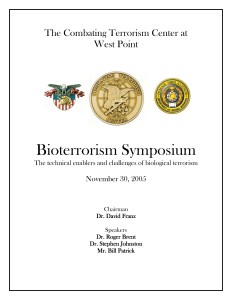Terrorists show a unique capacity to creatively use technology to achieve nefarious ends. The proliferation of chemical and microbiological expertise, coupled with the prevalence of modern terrorism, suggests that biological terrorism is a growing threat. More dangerous than chemical weapons and easier to acquire than nuclear devices, biological weapons are tempting terrorist weapons. Unfortunately, even after the anthrax attacks, the study of biological terrorism is still nascent.
The purpose of this workshop was threefold:
- First, to capitalize on the expertise of preeminent scientists and practitioners to educate USMA faculty and cadets.
- Second, to explore methodologies for translating their knowledge into curriculum that can be implemented in USMA classrooms and beyond.
- Third, to advance the overall debate about bioterrorism at USMA, and in particular spark a discussion about how to adjust West Point curriculum so as to better prepare cadets for an uncertain world in which bioterrorism is a real possibility. Our next generation of military leaders should have the capacity to engage the policy and technical issues that the nexus of scientific expertise and extremism pose to the United States and the world.
The workshop was split into two sessions: one on enabling technologies, and the other on technical barriers to bioterrorism. Speakers gave brief statements that were followed by discussions with the audience. The audience included participants from the Social Sciences, Chemistry/Life Sciences, Math, Electrical Engineering/Computer Sciences, Law, and Geography/Environmental Engineering Departments. They were joined by representatives from the University of Connecticut and the FDNY Fire Academy.
 Skip to content
Skip to content

